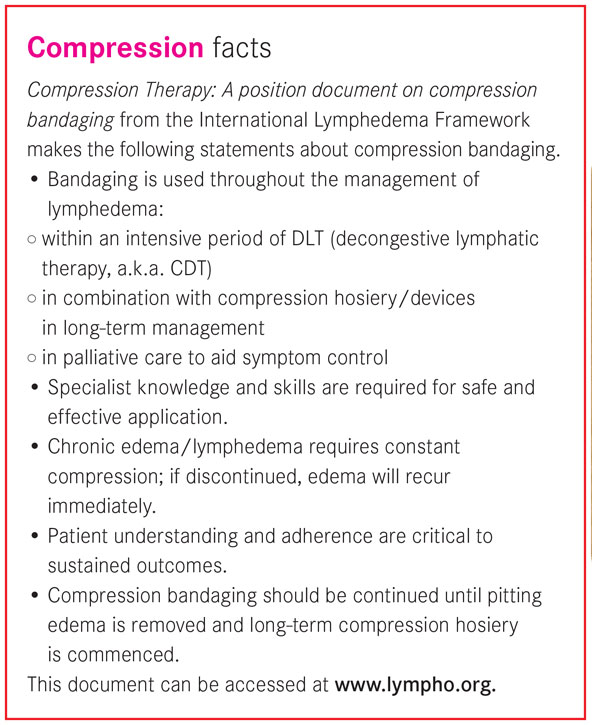What it means to your patients
By John Mulligan, RMT/CLT-LANA
Breast cancer–related lymphedema is a long-term side effect of breast cancer treatment; it results in permanent swelling of the affected arm. While it is not known exactly how many patients are affected, current estimates range from 15–25 per cent of patients whose lymph nodes have been removed from the axilla.
There are two types of lymphedema: primary and secondary. Primary lymphedema is a genetic condition, while secondary lymphedema is the result of acquired damage to the lymph system.
Seroma is distinguishable from lymphedema in that it is a pocket of fluid rather than a generalized swelling of the limb.
 Who is at risk?
Who is at risk?
Any patient who has had lymph nodes surgically removed is said to be at risk of developing lymphedema. This at-risk status lasts for the rest of their lives. One groundbreaking study by Petrek and colleagues followed patients for 20 years; it found that while 77 per cent of those breast cancer patients who developed lymphedema did so in the first three years after surgery, additional women developed lymphedema at the rate of one per cent per year.
There have long been lists of do’s and don’ts for patients at risk of developing lymphedema. It should be noted that in the Petrek study, the only consistent causative factors appeared to be an injury or infection to the at-risk arm, and weight gain in the post-treatment years. Clinically, I have seen one patient who developed lymphedema 40 years after a radical mastectomy. Onset occurred after a fall in which her wrist was broken.
Treatment
Lymphedema is treated with a protocol known as complex decongestive therapy (CDT). The treatment is considered to have two phases:
Phase 1: Intensive therapy. This treatment consists of manual lymph drainage, which is a hands-on treatment that encourages the movement of lymph fluid, and specialized compression bandaging, as well as exercise and self-care. Treatments are administered daily until the limb is reduced, or decongested. Multi-layer compression bandaging is worn 23 hours a day, allowing time for bathing or showering. Treatment is considered complete when pitting edema is no longer present.
Phase 2: Self-management phase. In this phase, patients manage their chronic condition by wearing compression garments during the day and wearing compression bandaging or a nighttime garment to sleep in. Compression is still worn 23 hours a day, unless patients
decide they can alter this schedule safely. They may also practise self-manual lymph drainage, and they are encouraged to exercise according to their ability and to live as healthy a lifestyle as possible.
 Who gets lymphedema?
Who gets lymphedema?
Of course, not every patient who has had lymph nodes removed develops lymphedema. How do we assess risk for lymphedema, and what do we tell patients who are at risk?
The following factors are known to increase the risk of developing lymphedema.
1) Women who have undergone axillary lymph node dissection are seen to be at higher risk than those who have only had sentinel lymph node dissection.
2) Generally, having more lymph nodes removed increases the risk of developing lymphedema.
3) Older women are more at risk of developing lymphedema than younger women, and patients with a sedentary lifestyle are at additional risk.
4) Obesity and weight gain add risk, and having more than one treatment-related complication (such as infections or bursting of the incision) can also increase the incidence of lymphedema.
What makes lymphedema difficult to predict is the fact that there is a great deal of variability in the lymph system itself. While numbers of lymph nodes in the body are fairly standardized (600–700), the number of lymphatic vessels that transport lymph fluid to and from the lymph nodes can vary from person to person. Using a radiographic technique called lymphoscintigraphy, it was found that the number of lymph vessels is higher in some individuals and lower in others. This affects the efficiency of the lymph system, and suggests that individuals with fewer lymph collectors might be at higher risk for developing lymphedema.
The effect of education
Lymphedema is multifactorial; it affects patients both cosmetically and functionally, and can have a negative impact on their quality of life. This negative impact can be avoided or reduced with treatment and patient education. In a 2008 study, it was shown that only 57 per cent of breast cancer patients received information about lymphedema. The patients who received this information reported significantly fewer symptoms. This is a powerful argument to educate patients about their condition.
The patients who were informed were also the most willing to make lifestyle changes in an attempt to avoid or delay its onset.
How does lymphedema affect people?
For the breast cancer survivor, lymphedema is difficult to cope with. They have already been through the cancer journey—including treatment, recovery and acceptance of the new reality of being a cancer survivor—and a diagnosis of lymphedema is often seen as the final insult after their long history of injury. Their lives have been centred on beating breast cancer; now they have to deal with a condition that is incurable, permanent and visible. For many, it is this visibility of the swollen arm that affects them most severely.
Patients at risk for lymphedema are often advised to avoid having blood pressure taken on the at-risk limb as well as not allowing needle sticks of any kind on that limb. These are considered common sense practices and have not been formally studied as risk factors.
Lymphedema and exercise
For many years patients with lymphedema were told to avoid repetitive or strenuous upper body exercise. However, in recent years it has been suggested that patients at risk for lymphedema, and even patients who already have the condition, may benefit from resistance exercise to increase their strength, allowing them to engage in a wider range of physical activities. Patients should not be asked to curtail any physical activity that they enjoy or is important to them, but they should be referred to a breast cancer rehabilitation specialist whenever possible, or have a functional evaluation done by a physiotherapist. Caution is advisable, but giving up beloved activities, such as tennis, golf, dancing or just playing with grandkids, is not something any patient should be asked to do. In helping patients understand the role exercise may play in helping them cope with lymphedema, it is helpful to be familiar with the study “Physical Activity and Lymphedema (The PAL Trial): Assessing the safety of progressive strength training in breast cancer survivors” by Schmitz et al. This study shows that progressive weight training and strengthening is possible, and even beneficial, for women with breast cancer-related lymphedema.
What next?
Until recently, patients with lymphedema often went untreated. Therapies were not widely known or utilized, and often a clinical diagnosis of lymphedema would be made but no treatment offered.
Things have changed dramatically in the past decade. There are more lymphedema therapists than ever before, and the networks connecting these therapists are getting stronger. The backbone of these networks is the regional associations of lymphedema therapists, patients and researchers who join together to improve access to care in their provinces. Some of these provincial organizations compile therapist directories for patient referral, or can provide referrals to therapists on request.
Some hospitals with cancer centres also offer some lymphedema assessment and referral to treatment in the community. These centres can be of great value in identifying need and connecting patients to therapists.
Patients need to know that the medical landscape is changing for the better, and that knowledge of lymphedema and its treatment is increasing. There is more research in progress now, and new connections are being made daily. Breast cancer–related lymphedema is a distressing condition, but it can be managed successfully and patients who develop this condition can still lead a happy and satisfying life.
John Mulligan is a Registered Massage Therapist and a Certified Lymphedema Therapist. He has been treating lymphedema patients for 15 years. Stephanie Phan pioneered a role for OTs in the Cancer Survivorship Program at Princess Margaret Cancer Centre. She is currently the Clinical Lead and provides patient-centred care in the Fatigue, Function & Mobility, and Lymphedema Clinics. Pam Hammond is a Registered Massage Therapist with training in Combined Decongestive Therapy in the Lymphedema and Function & Mobility Clinics at Princess Margaret Cancer Centre.














